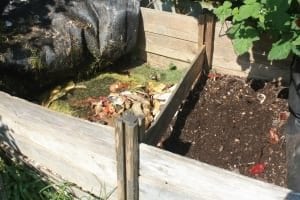The City of Cape Town has as of the first quarter of this year started rolling out Phase 2 of its home composting research project. “This is in line with ongoing investigations into waste minimisation as part of our commitment to being a caring city,” Cllr Ernest Sonnenberg, mayoral committee member for Utility Services, tells Chantelle Mattheus.
Caring city The “caring city” represents one of the five pillars of the Integrated Development Plan (IDP). The IDP is a strategy that was implemented in 2012 to provide the strategic framework for building a city based on five pillars: the opportunity city, the safe city, the caring city, the inclusive city, and the well-run city. These five key focus areas inform government of all of the city’s plans and policies. Critical impact If residents in the City of Cape Town compost their organic waste, this will effectively minimise garden and kitchen organic waste directed to the city’s landfills for disposal, subsequently reducing greenhouse gases, such as methane, which these waste streams currently generate in the landfill, says Sonnenberg. Additionally, he adds that for the individual residents the use of their organic compost in their gardens will enrich the garden soils, thereby stimulating plants grown. The City of Cape Town has invested a lot of time and effort into this project and similar alternatives because, as Sonnenberg states, the city currently has less than 10 years of landfill airspace remaining, compared with the international standard of 15 years, and has been in the process of obtaining a licence for a new regional landfill site for over 10 years. Phase 1: Pre-feasibility Phase 1 of the home composting research project (the pre-feasibility study) was undertaken during 2012, where 19 participants trialled the use of home composting containers for their kitchen organic and a portion of their garden waste, over a period of nine months. The city then analysed the data submitted by participants and, according to Sonnenberg, found that participants diverted between 2.5 40 kg of kitchen organic waste (originating from fruit and vegetables) per container per month into their home composting containers, with the majority of them diverting between 11 to 22 kg per container per month. “Participants also diverted an average of 1.8 kg of soft garden waste (such as grass clippings and leaves) per container per month into their home composting containers.” According to Sonnenberg, in addition to “the promising quantitative results”, the following positive observations were made in Phase 1 of the project: -participants were generally eager to use their home composting containers and to harvest the compost as soon as possible -participants, in some cases, enlisted their neighbours to get involved in the project or focused the composting at nearby community garden projects, some of which housed soup kitchens that produced a lot of kitchen organic waste, and also community gardens where there was a demand for the compost -generally, there were no problems with odours, vermin or nuisances arising from the home composting containers -in certain cases, the home composting containers had attracted beneficial earthworms, which further enriched the production of compost. “These results are promising, and Phase 2 of the research project (the feasibility study) has been commissioned to test the results of Phase 1 on a significantly larger scale, with approximately 700 participants from four different representative residential areas in Cape Town. In addition, households in the city are generally being encouraged to begin composting their garden and kitchen organic waste in an appropriate manner,” states Sonnenberg, adding that the City of Cape Town hopes to record similar diversion rates to that of Phase 1, which could be reason to motivate for further roll-out of home composting in the city in an appropriate manner. The impact of Phase 1 has already delivered measurable results. “During the Phase 1 reporting period, over 1 000 kg of kitchen organic waste and 250 kg of garden waste was recorded as being composted by participants who submitted comprehensive data,” explains Sonnenberg.Although additional participants did not record data for all the months they participated, all 19 participants used their containers for composting, indicating that this figure is an underestimate of the actual kilogrammes composted to date.
Furthermore, the participants have continued to use their composting containers after the project reporting period, therefore continuing to divert organic waste from landfills.“The participants’ enthusiasm has triggered the collection of organic waste for composting, as well as the use of this compost by a number of community food garden projects, with the associated benefits,” says Sonnenberg. Education essential Sonnenberg explains that in the city’s recruitment process, consultants went door to door in the project areas to invite willing participants. This engagement process included information sharing about the project and its expectations. On receiving their composting container, each participant received an information leaflet that explained every aspect of the composting project. “Following this period, residents have been e-mailing and SMSing questions specific to their individual challenges to the project team. Responding to these queries has given the project manager an opportunity to share additional knowledge with all participants,” says Sonnenberg. Practical priorities: Containers With regard to the system to be utilised by the homeowners, Sonnenberg indicates that the City of Cape Town advertised a request for quotations for home composting containers for the purposes of this project, which was won by the Green Genie 150 ℓ compost container supplier. “However, generally for home composting, this is not the only technology which the city supports, and it is essentially the residents’ choice in terms of the technology they wish to use. For residents who generate higher volumes of organic waste, building of a compost heap or carrying out trench composting is advised, and for those without gardens, a worm composting system is suggested,” says Sonnenberg. He adds that the use of bokashi effective microbes can also assist in the preservation of organic waste prior to composting. Challenging circumstances Phase 2 of the project is currently being undertaken to identify some of the potential challenges and potential solutions.“In any city, there would always be certain residents who would either be disinterested or unable, due to age or frailty, to participate in home composting. For those unable to participate in home composting, the city is hoping to investigate alternatives, such as community-based composting programmes, which could receive organic waste from these residents,” says Sonnenberg. However, challenges such as some participants being unable to read the city’s communications and composting instructions have already surfaced and the city is finding ways of dealing with them. “The city encourages such participants to get a family member to assist and keep in telephone contact, where possible,” advices Sonnenberg. In addition, there were participants who did not read the instructions sufficiently, and sent the project team the information in the incorrect format. This was resolved by further email, SMS or phone communication to rectify and explain these mistakes. “Some confusion was also caused by the fact that the container was originally sold with an insect repellent cap, which was later found by the supplier to be counter-productive. As such, the participants enquired about an insect repellent that could kill insects in the containers, such as fruit flies, and the project team needed to explain that these insects are not harmful, whereas an insect repellent could potentially negatively impact on other living organisms within the delicate composting process,” explains Sonnenberg. Rosy reception According to Sonnenberg, residents were eager to participate in this project, especially in areas that have previously been involved in other waste minimisation related programmes or received communication on responsible waste management. “It must be noted that certain participants underestimated the effort and commitment required by the project, so their enthusiasm waned slightly after participating for a while, but it is hoped that when they experience the benefits of utilising the compost, their enthusiasm will once again increase,” concludes Sonnenberg.





